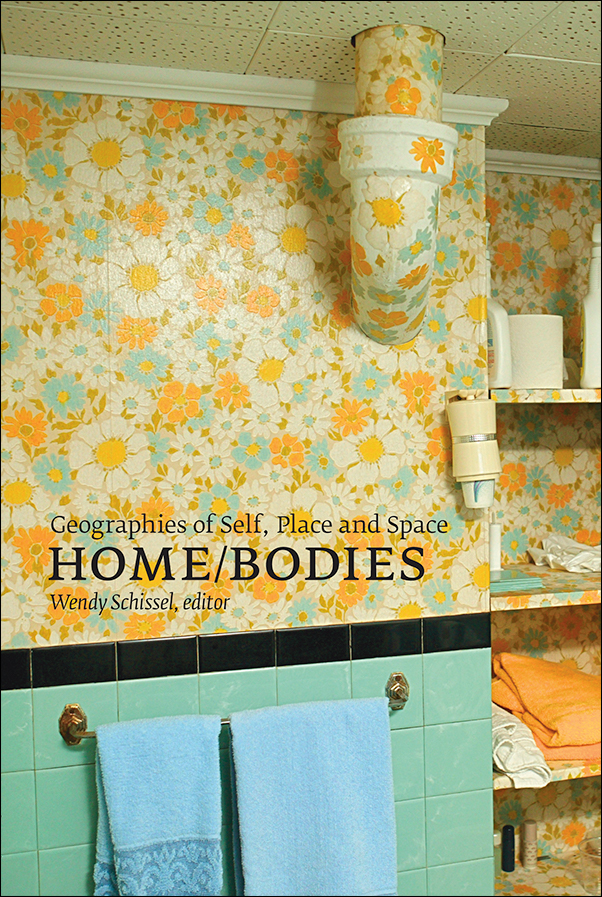
Home/Bodies: Geographies of Self, Place, and Space
Edited by Wendy Schissel
$34.95 CAD / $39.95 USD (S)
216 pages
6 x 9 inches
Paperback: 978-1-55238-184-7
Library PDF: 978-1-55238-364-3
September 2006
Bringing together diverse voices, research methods, and scholarships, Home/Bodies is an examination of the metaphorical geographies of bodies, places, and spaces as an exploration of concepts of home, gender, and identity.
With Home/Bodies, Wendy Schissel brings together a diverse range of voices which explore the concepts of home, gender, and identity.
The metaphorical geographies of bodies, places, and spaces are the backdrop for such topics as: transgendered identities; young people and sexual health; kinetic art and disability; adolescent girls and consumer society; palliative care for dying loved ones; women and social activism; and aboriginal and multicultural perspectives.
Qualitative research methods are referenced throughout, including interviews, case studies, focus groups, and narrative research. Home/Bodies includes contributions by several new-generation feminist scholars and researchers, along with established teachers, researchers, and activists in the academy and the community.
With Contributions By: J. Maria Pedersen, Tabassum Ruby, Coralee Drechsler, Sandra Jarvie, Ellen Whiteman, Allison M. Williams, Maureen G. Reed, Kim Morrison, Denise J. Larsen, Jennifer A. Boisvert, Jocelyn Lock, Tikker Percey, Dian Priebe, Linda Vaudan, Mary Rucklos Hampton, Barb McWatters, Bonne Jeffery, Pamela Smith, Donna L. Goodwin, Joan Krhon, and Arvid Kuhnle
Wendy Schissel is the Dean of Humanities at Mt. Hood Community College in Gresham, Oregon, and an adjunct professor at the University of Saskatchewan.
Acknowledgments
Introduction
Wendy Schissel
Part 1: Compound Fractures
Oppression and Indigenous Women: Past, Present, and Future—An Australian Kimberly Aboriginal Perspective
J. Maria Pedersen
Who Am I and Where do I Belong? Sites of Struggle in Crafting and Negotiating Female Muslim Identities in Canada
Tabassum Ruby
"Transgendered" Perspectives as a Challenge to Sex, Gender, and Sexuality
Coralee Dreschler
Part 2: Ruptured Sutures
Silent, Denigrated, and Rendered Invisible: Mothers Who Lost Their Babies to Adoption in the 1960s and 1970s
Sandra Jarvie
tell–me–what–I–want.com: Adolescent Girls, Consumer Society, and Information Technologies
Ellen Whiteman
The Impact of Palliation on Familial Space: Home Space from the Perspective of Family Members who are Living (and Caring) for Dying Loved Ones at Home
Allison M. Williams
Spinning Yarns of Women’s Activism in Support of Industrial Forestry on Canada’s West Coast
Maureen G. Reed
Part 3: Habitats for/of Humanity
Crafting Selves: The Impact of Idenity on Intercultural Friendships among Women
Kim Morrison
Women’s Professional Mentorship in Psychology and the Academy: One Group’s Stories of Quilting and Life
Denise J. Larsen and Jennifer A. Bosivert with Jocelyn Lock, Tikker Percey, Diane Priebe, and Linda Vaudan
Sexual Health of Young Women: Context and Care Make a Difference
Mary Rucklos Hampton, Barb McWatters, Bonne Jeffery, and Pamela Smith
Voices of Dancers with Mobility Impairments
Donna L. Goodwin, John Krohn, and Arvid Kuhnle
References
Home/Bodies showcases a wealth of women’s lived experiences, challenging readers to consider the contemporary complexity and diversity of gendered identity, embodiment, and belonging in place.
—Deborah Cowen, University of Toronto Quarterly